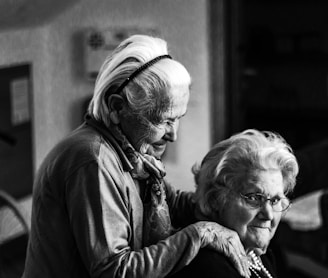Caring for a Loved One with Dementia: A Guide to Compassionate Care
Caring for someone with dementia involves more than just managing their medical needs. It’s about providing a supportive environment that respects their dignity and enhances their quality of life. Here are some key points to consider when caring for a loved one with dementia.
5/1/20242 min read
Understanding Dementia: Dementia is not a single disease; it’s an overall term that describes a wide range of symptoms associated with a decline in memory or other thinking skills severe enough to reduce a person’s ability to perform everyday activities. It’s important to understand the type of dementia your loved one has, as this can influence both the progression of the condition and the care required.
Creating a Safe and Comfortable Environment: Safety is a primary concern. This may involve making modifications to the home to prevent falls, ensuring that medication is managed in a safe way, and creating a routine that provides structure and familiarity.
Effective Communication: As dementia progresses, communication can become challenging. It’s crucial to use simple words and sentences, speak slowly, and maintain eye contact. Always listen patiently and show encouragement.
Personal Care: Assisting with personal care, such as bathing, dressing, and eating, can be sensitive issues. Approach these tasks with respect and understanding, and look for ways of maintaining their independence for as long as possible
.
Managing Behavioral Changes: Dementia can cause a range of behavioral changes, including confusion, agitation, and even aggression. It’s essential to remain calm, identify triggers, and create a calm environment. Distraction and redirection can also be effective strategies.
Support for Caregivers: Caring for someone with dementia can be physically and emotionally demanding. It’s important for caregivers to take care of their own health and well-being. This includes seeking support from family, friends, and caregiver support groups.
Professional Help and Resources: Don’t hesitate to seek professional help. This can include consulting with healthcare professionals, exploring respite care options, and utilizing resources from organizations like Dementia Australia, which offer support for families and carers.
End-of-Life Care: As dementia progresses to its final stages, end-of-life care becomes a consideration. It’s important to discuss and plan for this stage, ensuring that your loved one’s wishes are respected and that they receive compassionate care.
Caring for someone with dementia is a profound expression of love and commitment. While it can be challenging, it’s also an opportunity to provide comfort and support during a difficult time. Remember, you’re not alone—help and support are available.


